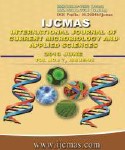


 National Academy of Agricultural Sciences (NAAS)
National Academy of Agricultural Sciences (NAAS)

|
PRINT ISSN : 2319-7692
Online ISSN : 2319-7706 Issues : 12 per year Publisher : Excellent Publishers Email : editorijcmas@gmail.com / submit@ijcmas.com Editor-in-chief: Dr.M.Prakash Index Copernicus ICV 2018: 95.39 NAAS RATING 2020: 5.38 |
Churu comes under Desert region of Rajasthan and agriculturally it is very important district. In Churu chickpea cultivation is very common but its productivity is very low. To establish the production potential of crop Cluster Front Line Demonstrations (CFLDs) is an appropriate tool. To increase the production and productivity of gram in the district, Krishi Vigyan Kendra, Gandhi Vidya Mandir, Sardarshahar, Churu-1(Rajasthan) conducted 125 demonstrations on gram during 2015-16 to 2016-17 in four adopted villages. The critical inputs were identified in existing production technology through farmers meeting and group discussions with the farmers. Average yield data of conducted CFLDs revealed that, higher yield (1767 kg ha-1) was obtained in demo plot over local check (1364 kg ha-1) and additional yield in demo plot was obtained 403 kg. Percent increase over local check was found 29.54%. Average extension gap, technology gap and technology index were found 402.33, 433.33 kgha-1 and 19.69% respectively. Averages of gross and net returns of demonstration were 29.17 and 42.69% higher than the farmers’ practice respectively. Most important factor B: C ratio indicates that whether CFLD technology is profitable or not. B: C ratio was found higher throughout the study and average was (3.10) in demonstration over local check (2.58). Review of data on incidence of disease in crop revealed that, percentage of damaged plant (9.83) was lower in demonstration as compared to (17.10) under farmers’ practice. Spraying of Quinolphos 25 EC @ 2.0 ml/liter water at the pod initiation stage reduces pod borer attack, consequently lesser infected pods (2.37) in demo as compared to farmers’ practices (7.9). Result suggested economic viability and agronomic feasibility of the CFLD technology for gram cultivation.
 |
 |
 |
 |
 |